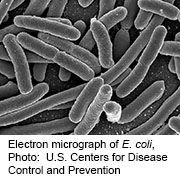Pennsylvania woman infected with E. coli that carried a gene for resistance against last-resort antibiotic
FRIDAY, May 27, 2016 (HealthDay News) — The first case of a patient infected with a superbug resistant to a last-resort antibiotic has been documented in the United States. The report was published online May 26 in Antimicrobial Agents and Chemotherapy.
The 49-year-old woman in Pennsylvania was infected with Escherichia coli that carried a gene for resistance against the antibiotic colistin. She recovered, but there are concerns that if this resistance spreads to other bacteria, the United States may soon be faced with superbugs unaffected by all known antibiotics, the Associated Press reported.
While other countries have already had cases of superbugs resistant to all antibiotics, this is the first time it has occurred in the United States. Tests confirming the woman’s infection were done by Walter Reed National Military Medical Center researchers, who reported on the case.
U.S. Centers for Disease Control and Prevention and Pennsylvania health officials are investigating to try to determine how the woman — who has not recently traveled outside of the United States — became infected with the colistin-resistant E. coli. The colistin-resistant gene has been found in people and animals in Canada, China, and Europe. American health officials said Thursday that colistin-resistant E. coli has been found in a pig in the United States, but added there was no apparent connection to the Pennsylvania woman, the AP reported.
Full Text
Copyright © 2016 HealthDay. All rights reserved.








